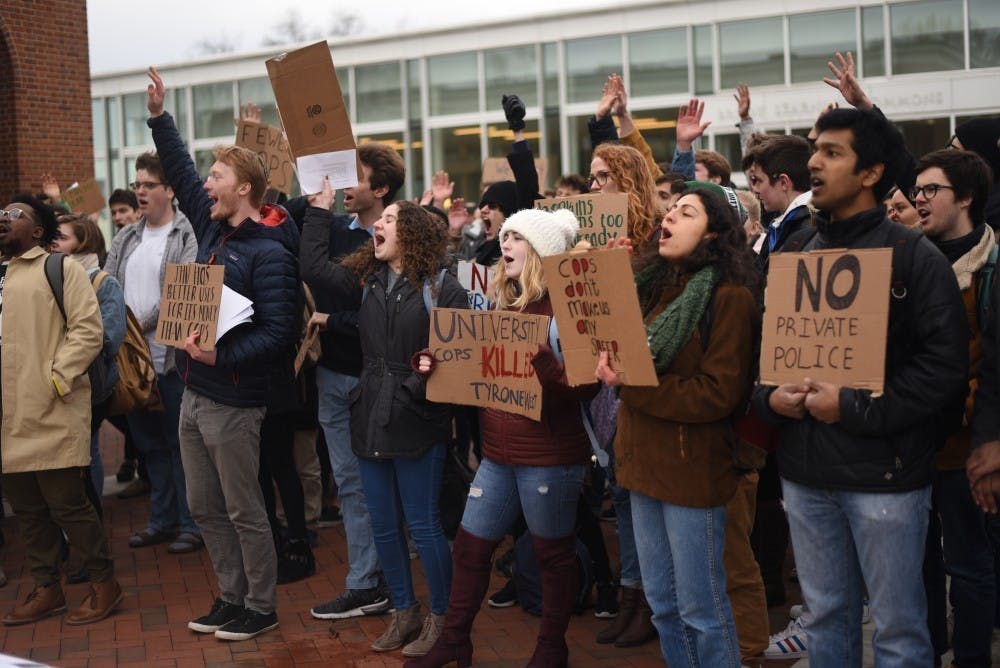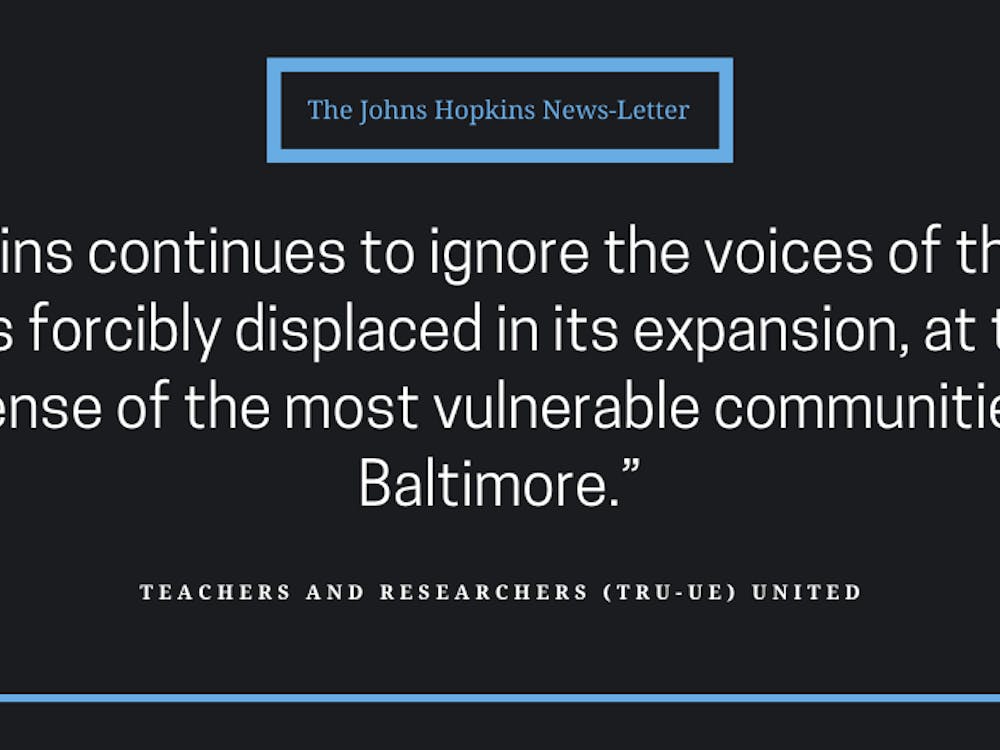Editor’s Note: This piece is an updated version of the previously published piece, “Maryland lawmakers will not support Hopkins police force bill.”
For the past month, Maryland legislators have been debating a bill that would give Hopkins the authority to form its own police force. Lawmakers announced on March 30 that they will not support the bill in its current form, and it will not be voted on during this legislative session.
In an email to students, faculty and staff, University President Ronald J. Daniels and Hopkins Medicine CEO Paul B. Rothman confirmed that the bill will be pulled for further review.
Those who oppose the creation of a private police force, like freshman Jason Souvaliotis, saw the announcement as a victory. Souvaliotis is a member of Students Against Private Police (SAPP), a coalition of 11 student groups including Students for a Democratic Society, Students for Environmental Action and the Black Student Union.
“I was so relieved and also really proud of the work that everyone did, glad that it came out to something and that the administration and legislators had heard our concerns,” he said.
Since the University first announced that it planned to create a campus police force on March 5, SAPP has worked to engage students and community members and has lobbied legislators to stop the bill from moving forward.
On March 8 SAPP marched to Daniels’ house to protest the University’s decision, and on March 12 they held a phone banking event where students called Maryland representatives to voice their concerns. Over spring break, several SAPP members testified in front of the Maryland House Judiciary Committee in Annapolis, Md.
SAPP member Kyra Meko explained that she and other students had planned to make a second trip to Annapolis on Friday to meet with lawmakers when she was alerted that the bill was no longer up for consideration.
“We found out at 12:30 last night that Delegate Curt Anderson was revoking support for the bill due to insufficient community outreach beforehand,” she said.
In a tweet early Friday morning, Anderson wrote that the bill in its current form will not be voted upon this session.
“After listening to the concerns of Johns Hopkins students and community folk we have halted legislative deliberations on their police bill,” the tweet read.
Anderson was unable to respond to requests for comment as of press time.
In their email, Daniels and Rothman explained that the current legislative efforts will require more time and input before the bill is ready to be voted on.
“We and the state legislature have decided that legislation to establish a university police department at Johns Hopkins requires further consideration and should be moved to an interim study rather than acted upon this year,” they wrote.
Vice President for Communications Susan Ridge wrote in an email to The News-Letter that the timeline for the interim study is still being determined.
“An interim study is convened by the chair of the committee of jurisdiction in the state legislature and involves gathering information and input on the issues involved in the bill,” she wrote. “It typically takes several months, concluding before the start of the next legislative session. We will learn more when the committee chair initiates the study.”
Ridge also clarified that the legislators and the University mutually made the decision to stop considering the current bill.
“We worked closely with our lead sponsors of the bill and other members of the legislature to determine [that] more time was needed to gather information and input from stakeholders,” she wrote.
Meko is still concerned by the interim study and the fact that legislators are continuing to examine the bill.
“We oppose a private police force unequivocally,” she said. “We don’t want a study. There already are a lot of statistics and data that show that this wouldn’t make people feel safer, especially people of color.”
While efforts to create a private police force will continue, Daniels and Rothman also wrote that they are committed to soliciting input and have appreciated hearing from students, faculty, staff and community members.
“Over the last month, we have been moved by the depth and intensity of interest in this topic at Hopkins and in the community, and we sincerely welcome the opportunity to continue this conversation,” they wrote. “The personal experiences, strongly held beliefs, and expert opinions we have heard significantly influenced our thinking on how best to move forward. And the resounding call for early and deep engagement, especially with our students and surrounding communities, will drive our approach in the months to come.”
David Tian, a second year Political Science PhD student, supports the creation of a Hopkins police department but thinks that gathering more community input will be beneficial.
“The University has not done a good job of building trust with the University community and the overall community. Having that level of trust is really important for policing,” he said.
Tian graduated from the University of Chicago, another urban institution with its own police force. As an undergraduate there, Tian said he personally had positive experiences with the police. He believes that having a private police department would allow Hopkins to better ensure safety and security.
“I would consider myself someone who is very pro-police. Being pro-police does not mean I want police officers to get away with crimes,” he said. “For me, what I think being pro-police is, is supporting police officers and respecting them for the dangerous and difficult work that they do, while holding them to the highest degree of accountability because of how much power they have.”
However, other students, like junior Chisom Okereke, completely oppose a Hopkins police department. In an email to The News-Letter, Okereke explained that she believes there are other more pressing issues that the University should address.
“We really do NOT need a private police force, especially on this campus,” she wrote. “The biggest threat many students face on this campus is either sexual assault from fellow students and/or internal struggles with mental health... I wish they approached these glaring problems with as much fervor as they’ve tackled this perceived “danger” from the surrounding community.
As a member of SAPP, Okereke worked to gather input from concerned students and community members. In particular, she spoke with black students and alumni who were worried about racial profiling. Although the bill will be halted for now, Okereke emphasized that it is important for students to remain engaged.
“This legislation could be brought back in future years so if the student body and community members don’t maintain this same drive and persistence, there could be a very different outcome the next time it comes around,” she wrote.
SAPP plans to continue its efforts to oppose a private police department. On Tuesday, they held a rally against private police, during which students can register to vote in Baltimore. After the rally, SAPP canvassed the neighborhood around Charles Village to inform community members about recent developments.
Meko explained that SAPP wants registered voters to pledge not to vote for candidates who support private police.
“This bill will be introduced next session, and it’s also reelection year,” she said. “We want to send a message that we’re organizing this for the long-term orientation now. Also it would be good to get people to register to vote in Baltimore.”
SAPP has also created a task force to work on evidence-based solutions that will address security concerns. The group understands that rising crime must be addressed but does not agree with the University’s current proposals.
“We’re not saying that crime isn’t a problem. We’re saying that private police on campus isn’t the way to solve it,” Meko said.























Please note All comments are eligible for publication in The News-Letter.